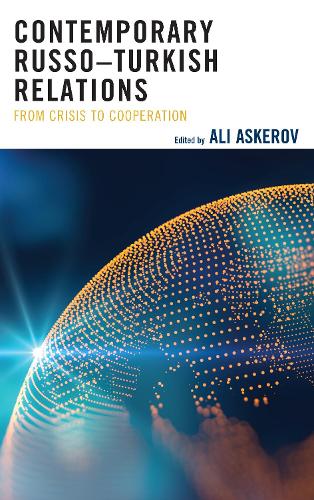
Contemporary RussoTurkish Relations: From Crisis to Cooperation
(Hardback)
Publishing Details
Contemporary RussoTurkish Relations: From Crisis to Cooperation
By (Author) Ali Askerov
Contributions by Ilyas Topsakal
Contributions by Sergey Kizima
Contributions by Chulpan Ildarhanova
Contributions by Lasha Tchantouridz
Contributions by Funda Civelekoglu
Contributions by Kamala Valiyeva
Contributions by Cemre Pekcan
Contributions by Tugce Varol
Contributions by Sean Byrne
Bloomsbury Publishing PLC
Lexington Books
20th June 2018
United States
Classifications
Professional and Scholarly
Non Fiction
327.470561
Physical Properties
Hardback
356
Width 159mm, Height 237mm, Spine 30mm
630g
Description
The Syrian Civil War started in March 2011 and still continues. It causes death, turmoil, humanitarian crisis, and mass migration in the region. Numerous state and non-state actors are involved in this multi-sided armed conflict. On 24 November 2015, Turkey shoots down a Russian fighter jet on its border and this event becomes the turning point in RussoTurkish relations. An economic and psychological war starts between Moscow and Ankara which damages their good relations existed before the crisis. Despite the crisis, the sides to the conflict understand that they need each other for their own benefits and look for reconciliation. Russia, a supporter of the Assad government in Syria, does not want to lose Turkey as a friend. Turkey, an energy partner of Russia, needs Russia to balance the power relations in the region. They are two neighboring countries with strong historical socio-economic ties that need to be restored. The reconciliation process is not easy and requires some third party role. The PYD/YPG-centered US policy in Syria affects Turkeys strategies.
Reviews
"This is an excellent and insightful set of essays about the state of Russian-Turkish relations - where they have been and where they are headed during the 21st century. It examines how the Turkish and Russian states are both cooperating and managing a full range of issue areas, some quite contentious. I highly recommend it" Michael Jackson, PhD, Senior Instructor, Norwich University The Military College of Vermont, Northfield, VT. This is a very useful and timely volume looking at the various issues at play in contemporary Russian-Turkish relations. The essays in this collection look at the issues and the areas that shape current Russia and Turkey interactions with each other over the past few decades. The various cases these essays address give us a refreshing look into the relationship between Russia and Turkey during the leadership of Putin and Erdogan. Students of International Relations and Comparative Politics whose focus is either Russia or Turkey will find many things to value here. Clifford A. Bates, Jr. PhD University Professor Warsaw University, Warsaw, Poland The Syrian Civil War started in March 2011 and still continues. It causes death, turmoil, humanitarian crisis, and mass migration in the region. Numerous state and non-state actors are involved in this multi-sided armed conflict. On 24 November 2015, Turkey shoots down a Russian fighter jet on its border and this event becomes the turning point in RussoTurkish relations. An economic and psychological war starts between Moscow and Ankara which damages the good relations they enjoyed before the incident. Despite the crisis, the sides to the conflict understand they need each other for their own benefits and look for reconciliation. Russia, a supporter of the Assad government in Syria, does not want to lose Turkey as a friend. Turkey, an energy partner of Russia, needs Russia to balance the power relations in the region. They are two neighboring countries with strong historical socio-economic ties that need to be restored. The reconciliation process is not easy and requires some involvement by third party actors.
The editor has brought together a group of foremost experts who provide an excellent overview and incisive analyses and assessments on contemporary Russo-Turkish relations. The contributing authors do a marvelous job explicating the complexities of the bilateral relations in a penetrating fashion in the local, regional, and international settings. This book is a must read for anyone who wishes to gain a deep and comprehensive understanding of these two crucial actors in the Middle East. Seung-Ho Joo Professor of Political Science, The University of Minnesota-Morris
Author Bio
Ali Askerov is assistant professor of peace studies at the University of North Carolina, Greensboro.
